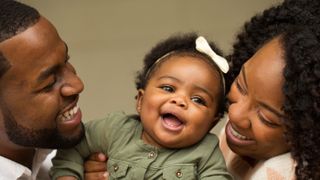Do Siblings Share More Genetic Makeup Than With Parents
Are you lot genetically more similar to your mom or your dad?

"He'due south the spitting image of his dad!" Or: "She's her mom'south clone — except for the nose. Clearly from her begetter'southward side of the family." As nosotros picket kids grow up, we tend to look for likenesses betwixt them and their parents. So which parent contributes more genetically?
The respond depends on whether you're asking about the full number of genes a kid inherits from mom and dad, or which parents' genes are really doing more. Merely either manner, scientists call back that the answer isn't exactly 50/50.
For instance, most people know that genes are carried on strands of DNA that are packaged into 23 X- or Y-shaped chromosomes. Those autosomes are housed inside a cell's nucleus, and the DNA they comprise comes equally from both of our parents. But the cell actually contains i other chromosome — hiding inside the mitochondria. The mitochondria, or the "powerhouse" of the cell, produces a cell's energy and plays an of import part in practice and aging, according to a 2011 review published in the journal Physiological Genomes (opens in new tab). The mitochondria also has its own set of Dna — and we inherit it only from our mom.
Related: Unraveling the human genome: half-dozen molecular milestones (opens in new tab)
"That'due south a articulate example that you lot're more similar to your mum than your dad," said Marika Charalambous, a geneticist at Rex's Higher London.
Some studies advise that our mitochondrial Dna — and therefore our mom — plays a primal office in our athletic endurance. For example, Spanish and Israeli scientists looked at one mitochondrial gene, which is associated with the corporeality of oxygen cells we can use during do. Their study, which was published in 2005 in the Periodical of Applied Physiology (opens in new tab), institute that a variant of the cistron associated with lower fitness was less frequent in elite cyclists and runners than in the full general population, a outcome confirmed by later studies. A series of studies brought home the importance of moms in the inheritance of this and other genes. They constitute that a mother'due south chapters for exercise alone can better predict a kid's chapters, than when fathers are taken into account.
Just instead of request which parent contributes more genes, yous might inquire which parent's genes do more than. Most of the surface-level differences we see between people are non due to the genes themselves, simply to a series of chemic "switches" that sit on top of our DNA and tell our torso which portions to read and translate into poly peptide and which to ignore, Charambalous told Alive Science. "There'due south a whole level of genetic variation between people that's not simply the sequences of the genes," Charambalous said.
In a phenomenon called imprinting, these switches entirely shut off certain genes — but only when they come up from a detail parent. These patterns persist across generations. For case, if gene 'A' is paternally imprinted, it will always work if it comes from your mom, but never if it comes from your dad. Most studies suggest there are between 100 and 200 imprinted genes in the torso, but some research suggests there could be more than, co-ordinate to a 2012 commodity published in the periodical PLOS Genetics (opens in new tab). These genes are particularly of import in the encephalon and the placenta.
There's some disagreement every bit to whether imprinting biases gene expression toward one parent or some other. Evidence suggests that there are like numbers of maternal and paternal imprinted genes, said Andrew Ward, a geneticist at the University of Bath in England. "In the traits which imprinting genes are responsible for, in a sense you are likely to exist more similar one parent than another," Ward told Live Science. In other words, imprinting may have an affect on certain traits — from our torso size to sleep and memory. But because imprinting happens on relatively few genes and those genes are likely balanced between parents, imprinting isn't going to determine whether you lot take a striking likeness to mom versus dad, Ward said.
Merely studies in mice practice suggest that there might exist some imbalance favoring fathers in this regard. A 2015 study published in the periodical Nature Genetics (opens in new tab) establish that imprinted genes were 1.5 times more than probable to be silent on the mom's side and active on the dad's side. An before study published in 2008 in the journal PLOS Ane found a like result. In the brain, the majority of imprinted genes were active when they came from the male parent. The opposite was truthful in the placenta. Notwithstanding, there's no evidence, at least not notwithstanding, that such an imbalance happens in humans.
Only even if imprinted genes bias cistron expression from one parent over the other, it wouldn't necessarily make you more similar to that parent. After all, the gene that'due south agile in y'all might exist silent in them, said Edward Chuong, a genome biologist at the University of Colorado Boulder.
"You can say information technology [your factor expression] is thanks to your parents," Chuong told Live Science, "Only information technology'south complicated to say it's like to your parents."
Originally published on Alive Science.
Source: https://www.livescience.com/more-genes-from-mom-or-dad.html
Posted by: trimration.blogspot.com

0 Response to "Do Siblings Share More Genetic Makeup Than With Parents"
Post a Comment